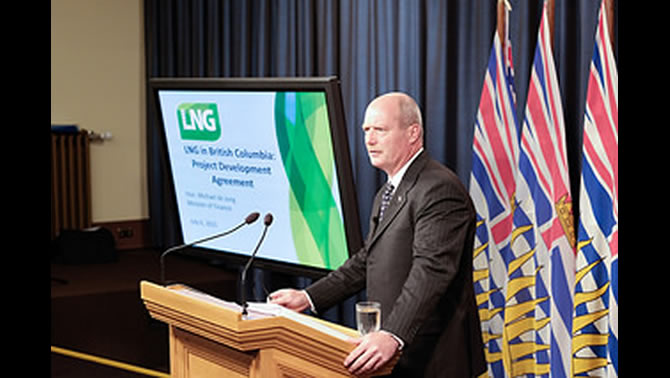Province of B.C. releases first LNG project development agreement

The Project Development Agreement (PDA) signed by the Province and Pacific NorthWest LNG marks a major milestone on the path to realizing the largest capital investment in B.C.’s history, Finance Minister Michael de Jong said in publicly releasing the full agreement on Tuesday, July 7th, 2015.
The agreement between the Province and Pacific NorthWest LNG is the first of its kind with an LNG proponent. It sets out the ratification process for the company and for government, identifies important milestones toward achieving project certainty, and provides long-term certainty that the investments will be treated equitably and consistently over the term of the agreement.
The agreement provides the proponent with assurance through legislation to be proposed and debated in the legislature that it will not face significant increases in certain specific taxes and environmental charges for the specified term of the agreement:
- The LNG Income Tax.
- The Natural Gas Tax Credit.
- The Carbon Tax (specific to liquefying natural gas at an LNG facility).
- The key features of greenhouse gas emissions regulatory scheme at an LNG facility.
The PDA does not provide the proponent with assurance on laws of general application, such as changes to provincial sales tax or corporate income tax.
Pacific NorthWest LNG plans to build an LNG facility on Lelu Island, located in the District of Port Edward on land administered by the Prince Rupert Port Authority. The first phase of the project would consist of two liquefaction trains, two LNG storage tanks, marine infrastructure with two berths for LNG carriers, a material offloading facility, as well as administration and auxiliary buildings. The facility would liquefy and export natural gas produced by Progress Energy Canada Ltd. in northeast B.C. for transport to Lelu Island by the Prince Rupert Gas Transmission project proposed to be built, owned and operated by TransCanada Pipelines Ltd.
Pacific NorthWest forecasts the US$36-billion investment is expected to support up to 4,500 jobs at peak construction, 330 direct operational long-term jobs, and 300 local spin-off jobs, in addition to significant new revenues for local government, the provincial government, and the federal government.
de Jong signed the PDA on behalf of the Province May 20, 2015, in Vancouver, initiating a ratification process by both the proponent and the B.C. legislature. Government is recalling the legislature on July 13, 2015, to introduce and publicly debate legislation that will enable the PNW LNG agreement and future potential agreements.
Key Quotes:
Michael de Jong, Minister of Finance -
“There are significant benefits for B.C.’s economy associated with the development of LNG activity. At approximately US$36 billion at total build-out and operation, this project represents the largest capital investment in the province’s history. And with this project come jobs for British Columbians and a new revenue stream from taxes and royalties that will provide benefits for British Columbians well into the future.”
Rich Coleman, Minister of Natural Gas Development -
“We are creating jobs and stimulating economic growth through the development of a new export industry. This project development agreement with Pacific NorthWest LNG is a way to secure those benefits.”
Quick Facts:
- Between 2015 and 2020, Asian economic growth and the switch to a cleaner fuel will almost double the demand for liquefied natural gas.
- B.C. has a natural gas supply estimated at 2,933 trillion cubic feet. This could support domestic and export markets for the next 150 years.
- Natural gas is the cleanest-burning of all fossil fuels and results in lower greenhouse gas emissions and pollution when it replaces coal-fired generation.
Learn More:
For more information on Liquid Natural Gas in British Columbia, check out LNG in BC:http://engage.gov.bc.ca/lnginbc/